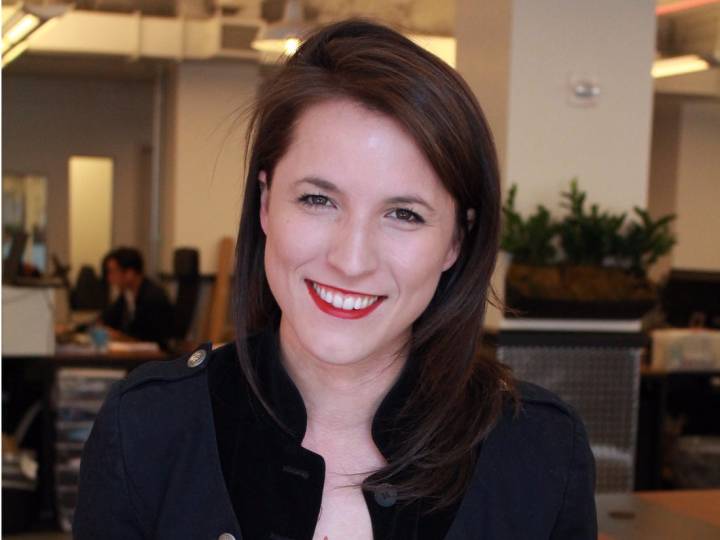
Kelly Peeler: Taking on the Goliath of student loans … via text
Kelly Peeler: Taking on the Goliath of student loans … via text

Change comes in all shapes and sizes, causing seismic shifts and small ripples in industries, businesses and the economy. In the series “Changemakers,” Marketplace explores the changes five women have made in their respective industries, and what they hope to see moving forward.
College is expensive. The way you pay for tuition, books and accommodation could impact the rest of your life, from career decisions to your ability to take out a mortgage.
With this in mind, Kelly Peeler decided to set up Money Mentor, a service providing financial guidance over text for free. According to Peeler, the company has helped more than 120,000 students access over $45 million in financial aid.
Her social mission also makes financial sense. Today’s college students make up part of Gen-Z, a demographic of more than 70 million people born after 1996, according to Pew research. It’s also a demographic that, according to Peeler, has $140 million of purchasing power.
As part of Marketplace’s “Changemakers” series, I spoke with Peeler about her work. Below are edited segments of our conversation.
On the beginnings of Money Mentor:
I started the company in 2014. I’m someone who personally loves building products and services to empower students or the next generation.
Money Mentor is actually not my first company. I started the first student-run incubator in Iraq, which helped students over there build and sell their own companies in an effort to rebuild their economy. I helped start a company in college that empowered female college students to create their own content, a sort of social network.
I studied the history of financial crises during the housing crisis in 2008 and I went to work at JPMorgan. And there I was asked to build large investment portfolios with the thesis of trying to short the student loan market. And that’s when I personally started digging around and really trying to understand, you know, what does this $1.5 trillion of outstanding debt mean? How does it impact the 44 million Americans who hold it?
And after kind of digging into that, I was like, wow, as a student of financial crises, this feels like the next financial crisis.
On the crisis of student loans:
I really feel like the market itself is defrauding millions of students by signing them up for something they don’t fully understand and then saying, “Oh, you know, it’s going to be your problem. We can’t deal with it.” And then coming back and saying, “Oh, and by the way, some of you weren’t even old enough to vote when you took out these loans, so, actually, your voice will not be heard and you can’t get out of this.” That just, quite honestly, it pisses me off.
For this demographic of users, the biggest thing holding them back is their — on average — $37,000 of student loan debt. That will prevent them from doing things like owning a house, having a family, picking the career that they want to pick. And so if I was going to really pursue this interest in empowering young people, that just seemed like such an obvious problem to tackle and think about redesigning [in an] entrusted way.
We don’t provide financial literacy, we provide financial convenience to that user who has their own complexities. And that was something that a lot of people have tried and failed to do before.
On the business of helping students:
We’ve helped more than 120,000 students access a little over $45 million in financial aid as opposed to taking out student loans. And we’ve done that all over text message. So we provide financial coaching and guidance, 24/7 over text message.
We coach a student from senior year of high school through senior year of college and beyond on anything from filling out their FAFSA — the main financial aid document — to negotiating their college tuition, to finding the best meal plan.
Over $2 billion every year goes unclaimed in free financial aid, free money for college, because students do not fill out things, fill out paperwork, for example, the FAFSA. So we help students fill out that FAFSA, which can get them up to $5,000 per year as opposed to taking out $5,000, plus interest, per year.
On making use of technology:
Why text message? It’s because that’s where Gen Z’s attention is. And not just like any old attention, but trusted attention. I mean, that is the prime channel to be able to have a trusted personal conversation such that you would be having it with your friend. And that’s really important because we’re talking about such a stressful and personal topic.
On why she does this work:
For people who are really entrepreneurial at their core, part of it is just like the dynamics of wanting to build something. In it, there’s just an implicit David and Goliath, right? The game of building something just implies that there’s a market to be the David versus the Goliath already there. And that’s the example that I give of why business is really cool and entrepreneurship is really cool: I just like being the David, I like fighting and doing what I think is right and creating a system that can help people, that can create enterprise value.
To listen to Kelly Peeler, click on the audio player above.
There’s a lot happening in the world. Through it all, Marketplace is here for you.
You rely on Marketplace to break down the world’s events and tell you how it affects you in a fact-based, approachable way. We rely on your financial support to keep making that possible.
Your donation today powers the independent journalism that you rely on. For just $5/month, you can help sustain Marketplace so we can keep reporting on the things that matter to you.












